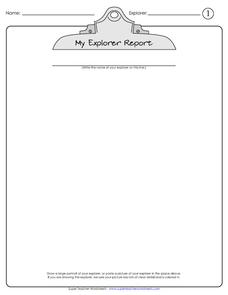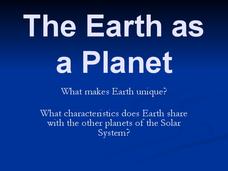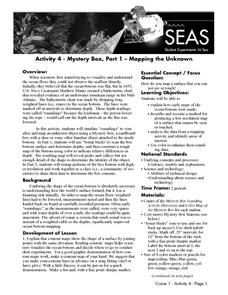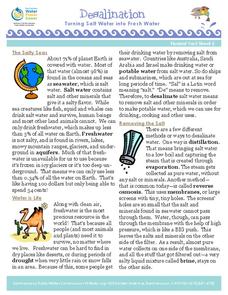Curated OER
Ecological Cycles Part 1
Knowing about the hydrologic cycle is the first step to understanding the carbon cycle. Upper graders discuss the earth's water content, polar ice caps, and the concept of the ecological cycle as it applies to carbon, nitrogen, and other...
PBS
Breaking it Down
After challenging themselves to correctly choose the form of erosion and length of time required for a given landform to develop, earth science class members model mechanical and chemical weathering with various lab demonstrations over...
Devine Educational Consultancy Services
Geography Student Workbook, Australia
Your youngsters will be experts on the geography of Australia after working with these activities and worksheets, which review the continent's weather, major landforms, dimensions, history, and climate.
Super Teacher Worksheets
My Explorer Report
This is the perfect resource to accompany your class project on famous explorers! Learners detail basic information about their chosen explorer, his/her main events of exploration and means of transportation, and finally, illustrate the...
NASA
How Does a Hurricane Form?
Young meteorologists examine the formation of a hurricane in a resource focused on severe weather conditions. Once they learn that a hurricane is also a tropical cyclone, and detail the different levels associated with tropical storms,...
NOAA
Ocean Zones
How can organisms light up in water? Bioluminescence is light produced in a chemical reaction that can occur in an organism's body. First, learners determine what happens to light/color as you move into the deep ocean. In groups, they...
Colorado State University
What Is a "Convection Cell"?
Round and round in circles it goes! A hands-on activity has learners recreate a model of a convection cell. They watch as the difference in density of their materials creates a current.
Glynn County School System
The Earth as a Planet
What does our planet have in common with other planets? What makes it unique? Find out in a PowerPoint presentation highlighting many earthly facts! The lesson describes Earth's atmosphere in detail and adds many other important facts...
American Museum of Natural History
Make Your Own Creatures of Light
Bioluminescent animals are the focus of a hands-on craft in which scholars create a scene of either a land or sea bioluminescent creature.
Curated OER
Mapping the Unknown
Students explain how early maps of the ocean bottom were made. They describe and execute a method for producing a low-resolution map of a surface that cannot be seen or touched. Students analyze the data from a mapping activity and...
Curated OER
John Fitch: Pioneer Steamboat Inventor
Students explore the transportation revolution brought about through the use of steam power to move boats over water. They practice note taking skills by taking notes from an article.
Curated OER
Atlantic Ocean Map Quiz
In this online interactive geography quiz activity, students respond to 7 identification questions regarding the Atlantic Ocean.
Curated OER
Pacific Ocean Map Quiz
For this online interactive geography quiz worksheet, students respond to 5 identification questions regarding the Pacific Ocean.
Curated OER
Blue Whales
In this comprehension instructional activity, students read a 1-page expository text about blue whales and then complete 3 short answer and 2 multiple choice questions.
Curated OER
Diatom Ooze
Students explore seafloor sediment. In this ocean environment lesson, students describe the characteristics of different types of seafloor sediment and oozes. They compare and discuss locations of sediments and oozes by plotting the...
Curated OER
Phytoplankton
In this phytoplankton worksheet, students read and study online information on plankton blooms to answer 8 short answer questions about the topic.
Curated OER
Should We Hunt the Largest Animals on the Planet?
Students discover details about whaling. In this environmental stewardship lesson, students research selected websites to locate information about commercial whaling and its implications.
Curated OER
Geography: Physical Features
Physical features in our geography are outlined in this colorful PowerPoint. First, different physical features are listed. Then, they are defined with a corresponding graphic. Tip: While presenting this slideshow to your class, ask them...
San Francisco Public Utilities Commission
Desalination: Turning Salt Water into Fresh Water
How does San Francisco supply its citizens with enough water, even during a drought? Learn about reservoirs and why desalination could be a good solution with a reading passage about water conservation. After kids finish the...
Curated OER
Soil Runoff Challenge
Students find ways to decrease soil runoff for an African Village as a part of a Peace Corps project. In this soil runoff lesson, students play a soil runoff challenge online. Students complete online activities and view a slide show to...
Curated OER
Christopher Columbus
In this Christopher Columbus worksheet, 3rd graders will read a six paragraph passage. Students will then answer seven multiple choice questions about what they have read.
Curated OER
Early Exploration of North America
Third graders "travel" from Europe to North America as Columbus did. They organize the information into chronoglogical order.
Curated OER
Canada, O Canada
Students study the similarities and differences between Canada and the United State in this unit. They examine geography, government and culture as they "travel" through Canada.
Curated OER
Hunt the Fact Monster Hunt #23
In this internet research worksheet, students answer three multiple choice and seven short answer questions by using the Fact Monster search engine.

























